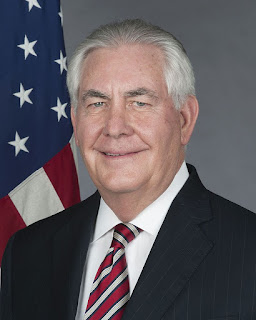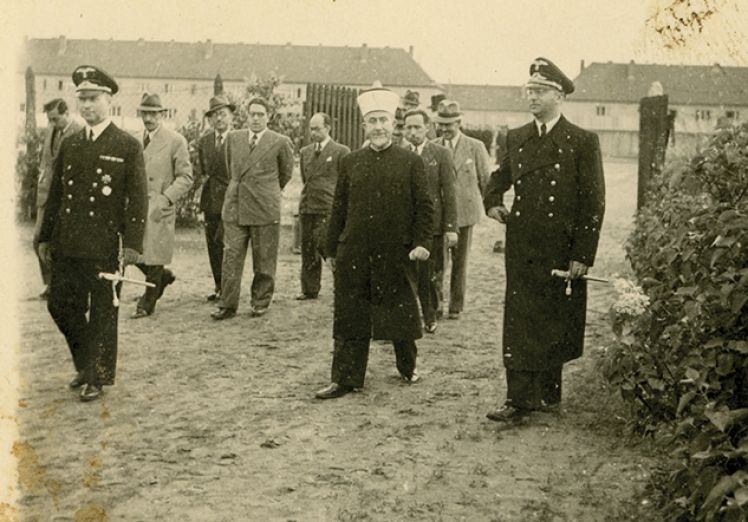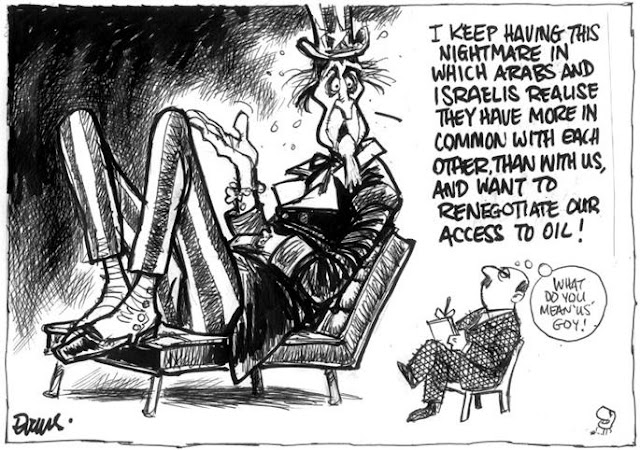Jenni Heltay Menashe is a charismatic lady who likes to
show people around the Temple Mount. I'm a little in awe of all the people
involved with the revival of our rights to this holiest site of the Jewish
people—see for instance, my
interview
with Yosef Rabin—and I knew I had to interview
her. I wanted to know
more about what she does, what she
knows about
Har HaBayit, the
Temple Mount. Getting out this column was the excuse to get an in depth look at
all the amazing things this 51 year-old powerhouse is doing. I know you'll
enjoy reading this as much as I enjoyed the digging and prying into Jenni's
life.
We live in exciting times!
Varda Epstein: Do you work for yourself?
All of the organizations connected to the Temple Mount are
now under a single umbrella,
United
Temple Mount Movements. There's really so much going on today, so many
organizations. There's actually a
kollel, a learning collective for
Torah scholars on the Mount! A bunch of
Haredim
(black hat orthodox) come every day and they learn about things like the
avoda,
the Temple service. There are great people involved, for instance, Yaakov
Hayman, who took over where Yehudah Glick left off because
Glick couldn't
go up to Har Habayit after he became an MK. Elyahu Weber was the
mashgiach,
the
supervisor, for the
Eda HaHaredit (an important board of
haredi
rabbis), and a teacher. He was a giant who gave up his position to run the
kollel.
He's awesome. A
talmid chacham (a learned man).
Varda Epstein: How long have you been doing this work?
 |
| Today, Jews from every sector visit the Temple Mount |
Varda Epstein: How would you describe yourself
religiously? I'd guess Chardal?
Jenni Heltay Menashe: Yeah. I'd probably call myself
chardal
(
haredi leumi or strict National Religious). I definitely wouldn't call
myself
haredi. Our
posek (halachic arbiter, rabbi) is
Mordechai Eliyahu.
Varda Epstein: Where are you from originally—I'm hearing
a Canadian accent? When/why did you make Aliyah?
Jenni Heltay Menashe: I was born in Edmonton and grew up in Winnipeg.
When I came to Israel in the 1980's I was going to be a Conservative rabbi. I
came with USY on a year program. Once I was here, I became religious, became shomer
Shabbat (Sabbath observant), and I stayed.
Varda Epstein: When did you first go up to the Mount?
Jenni Heltay Menashe: I was 13. I came with my parents for my bat mitzvah in
1979. We weren't religious. In those days, you could go up there anytime, no
problem.
Varda Epstein: What was that like?
Jenni Heltay Menashe: We had a secular tour guide, he wasn't
religious. We went into the mosque and walked all over the mountain. Today,
non-Muslims can't go into any building on the Mount.
Varda Epstein: What buildings are there aside from the
mosque?
Jenni Heltay Menashe: There's the
museum. They
display things like rocks they threw at Jews, bloody shirts, you know, anything
that has to do with their "struggle."
Varda Epstein: So you went up when you were 13. When was
the next time?
Jenni Heltay Menashe: The next time was after I did the
course with Kapot HaManul. This is a wonderful organization founded and
run by Avia Frankel, a young PhD candidate. The main mission of Kapot HaManul,
is to ensure there's a tour guide available at the Mount to explain things
properly during all the hours the Mount is open to non-Muslims, for instance
Christians and Jews. We help explain things about the kedusha (holiness)
of the place and so forth.
 |
| Jewish women go up to the Mount, as well. |
Varda Epstein: Do you receive a salary for your work?
Jenni Heltay Menashe: We receive a small stipend. We're paid
for our time. We have to be there at 7 AM. During summer hours, for instance,
the Mount is open to non-Muslims from 7:30-11:00 AM and then from 1:30-2:30 PM,
though during Ramadan, there are no afternoon hours for non-Muslims.
Only one group of Jews is allowed up at any one time and
only with a police escort. There are the regular police and the Waqf (Jordanian
Muslim Authority) security in attendance. We always have Waqf security people. Their job
is to watch to make sure no one's lips move in prayer. They're paid by Jordan
to make sure the Jews don't pray, God forbid.
Varda Epstein: How many police accompany a group?
Jenni Heltay Menashe: There's no rhyme or reason to it. There
might be 25 people in a group accompanied by 10 policemen and 7 Waqf people.
Once I went by myself and I had 3 regular police and 2 Waqf guys and I felt
like a rock star!
It's a little silly to be honest, but it is what it is. So
for instance,
last
week when they were throwing rocks, the regular police moved us away very
quickly as soon as we realized what was happening and the
yazam, the
antiterrorist police, blocked off the mosque so the guys in the mosque throwing
rocks, couldn't get out.
I can tell you as someone who's been going up for a long
time, there's been a change. It was tense. The police were there to keep us in
line for the Waqf, but since Rosh Hashana there's a new police commander,
there's new staff at security where you go in, and they're much more relaxed.
It's so much more pleasant.
I credit the commanders for this change in attitude. I think
that part of that is because of Avia, because part of her job is to negotiate
with the police. But the new people are great. That would be Danny Mizrachi who
is police commander for all of Har HaBayit, and Yuval Kaminetz on
security at the entrance. A lot of the regular police are Druse—the people on
tour get nervous: why are they speaking all of this Arabic? But they're Druse.
They're great!
Varda Epstein: So what do you do during the tours,
exactly?
Jenni Heltay Menashe: We explain to people why we go where
we go and why we don't go where we don't go. This is what we're trained for. It's
important. Some of the rabbis are afraid to go up because they're afraid
they'll go to the wrong areas.
Varda Epstein: Speaking of rabbis, do you know Rav Yisrael Ariel? I worked
on a museum exhibition for him, on the bigdei kahuna (priestly garments).
Some of my handspun linen thread is in those garments.
Jenni Heltay Menashe: Sure! He's so interesting to tour
with. Rav Ariel was one of tzanchanim,
the parachutists who liberated the Mount.
Rav Ariel is one of the few people who understands the
relative importance of the Mount as compared to the Kotel (Western Wall).
The Kotel is a consolation prize.
Actually, this is a really bad analogy, but it's like a
contest between Miss America or Miss Congeniality, and we're picking Miss Congeniality.
I'm not saying Miss Congeniality isn't important; there's always a Miss Congeniality.
But we went to the Kotel because we couldn't go to the Temple Mount. Now
that we can, there's no reason we shouldn't.
Of course, there's the issue of
tvila, the need for ritual immersion before ascent. Some rabbis were looking into this. There's a place near
Shaar
HaShvatim (Gate of the Tribes), along the northern wall, an entrance
you can go into without
tvila. But
Nashim L'Maan HaMikdash
(Women for the Sanctuary) were against that. It's a good thing to do
tvila before ascending to the Mount.
Nashim L'Ma'an HaMikdash is basically Rina Ariel and
her sisters. You know who Rina is, the mother of
Hallel
Yaffa Ariel, HY"D (may God avenge her blood)? They make an
aliya (go up)
to
Har HaBayit twice a month.
Usually on
yod chet, which is
chai, life, and somewhat the middle
of the month; and also on
Rosh Chodesh, the first day of each new month.
 |
| The Mosque was built on the site of the Kadosh HaKadoshim, the Holy of the Holies. |
Varda Epstein: I know they were pushing to rename Mughrabi
Gate "Shaar Hallel," Hallel's Gate.
Jenni Heltay Menashe: Oh, we all call it
Shaar Hallel.
Those women are amazing. They have a
Beit Midrash Mikdash (a Sanctuary
study hall) in three locations, Kochav Yaakov, where I live, Kiryat Arba, where
the Ariels live, and I think in Mevasseret. We learn all about
Har HaBayit
and the
avoda, and sometimes we do physical things connected to the
Mount like weaving or making challah in the style of the
lechem panim, the display breads or
shewbread.
And there are other groups. There's a group that does
practice runs for the Korban Pesach (Passover Sacrifice) and they do the
Omer (harvest offering) on the first intermediate day of Passover. You can't do it on Har HaBayit, so they
did it in the Rova (Jewish Quarter of the Old City). People can come and
see them do a practice run for all kinds of things. On Shavuot, they did
the shewbread
with the 2 loaves of bread.
We're so close we're practicing the ancient rituals. So when
we finally can, we'll know how to do it. And I find it's one of the things
that's bringing achdus, unity, because all of the different eidot
(factions) are coming together to do the avoda of the Beit HaMikdash.
Varda Epstein: Why do you think Moshe Dayan gave the
Temple Mount back to the Waqf in 1967?
Jenni Heltay Menashe: Dayan. Bless him. I'm really convinced
he believed that giving the Waqf control of the Temple Mount was going to bring
peace. He thought it was the war to end all wars and that now there would be
peace. Hey, they all thought that! The fact that there's no peace is
shocking to them.
He really thought it would bring peace. I think he was misguided
but he wasn't being nasty or anti-religious. I am convinced he wanted peace.
I don't want to think so badly of anyone and there is
this element of him being a hero. History will tell whether he was the smartest or
dumbest man in history. We had the Mount and now we only have it in a very limited
way. Look at Mearat HaMachpela, the Tomb of the Patriarchs, in Hebron. Jews
and Muslims split it half-half. Why can't it be like that with the Mount?
We thought it was such a miracle, what happened in '67. They
thought there would never be another war. It's difficult for us to understand
that, but if you speak to the men who were soldiers then, that's what they all
say.
 |
| The Waqf threw a tarp over these ancient wooden beams which have been carbon dated and go back to Temple times. |
 |
| Ancient beams made from the wood of cypress and cedars of Lebanon trees, discarded as refuse in the Shaar Rachamim compound on the Temple Mount. |
Varda Epstein: What should we be doing to take back the
Temple Mount?
Jenni Heltay Menashe: 991 Jews went up on Yom Yerushalayim,
Jerusalem Day—it was a record. They should have called in the Guinness people. But
it should be like that all the time. Why should we have to wait to go up? The police
are going to have to change their rules, so we don't have to wait.
Maybe we need to lobby the Knesset. They close Har HaBayit
to Jews on all these Muslim holidays, why couldn't they open it up on Jewish
festivals for Jews only?? We need to force the government to make changes for the
better.
The Church of the Holy Sepulchre is open all the time. Why
are there limited hours for Jews to visit the Mount? It should be open all the
time.
How many Jews make trouble on the Mount? Go up there
specifically to pray? And anyway the law says we can pray there. So why can't
we do it?
They call it a provocation. We need clearer laws.
Ya know: in what other country would a people give up their
holiest place and say, "We won't pray in our holiest place, we'll take the
consolation prize?"
We need to shift our mentality back. Shift it back to what a
Jewish mentality should be.
Varda Epstein: What do women need to know about going up
to the Temple Mount?
Jenni Heltay Menashe: Women have to separate from their
husbands either 3 days or two days, so there's a shalom bayit problem, a
problem for married couples. There's a 1-day leniency for some. Then a woman
has to dip in the mikveh, the ritual bath. There's an issue with single girls
going to the mikveh. Some mikveh attendants won't allow this.
Anyway, because of the separation between husbands and
wives, a lot of the rabbis are against it (women going up on the Mount). And
that's the major difference between men and women. Men don't have to separate
from their wives. They just tovel (dip in the ritual bath) in the
morning, no problem.
It's a problem for a woman to take a break (from marital
relations) for three days. There are already so many days a woman can't be with
her husband (because of menstruation). You have to have a husband who is pro
(women going on Har Habayit). If he's anti, she definitely shouldn't go.
The biggest issue, of course, is you must plan it all out.
But a lot of what is happening today in this sphere, with
Har
Habayit, is due to women, the push of the women, like in Egypt and in the
desert, how the women helped perpetuate our nation. Do you know there's even
Beit
HaMikdash jewelry, beautiful jewelry with symbols that evoke
Har HaBayit.
Sarah Feld of Beit El makes amazing jewelry. Maayan Ayash designed Rina Ariel's
necklace with a gate that says "
Zeh HaShaar, Shaar Hallel" (This
is the Gate, Hallel's Gate).
 |
| The entrance to the Holy of Holies with the Hebrew words "Oro Shel Olam" or Light of the World. Original Jewelry by Sarah Feld. |
 |
| Pomegranate with pearl reminds us of the Priestly garments. Original jewelry by Sarah Feld |
There are new things at the
Kotel, too. There's
something called
A
Look Into the Past, which is a virtual tour of the
Beit HaMikdash,
you sit on a chair, put on these
goggles, turn 360 degrees, and you tour the
Beit HaMikdash, it's like
you're really there. Everyone raves about it. I've taken people there and they
just cry.
The other tour there is the
Journey
to Jerusalem, a computer-activated program where the
Bayit Sheni
(the Second Temple) has just been destroyed. The Jews have to run away: where do you go? You have
options.
It's been good for the Jews for a couple hundred years,
then, all the sudden, it's not so good, so where do you go? You could do the program 200 times and never
get the same journey. I've done it 50 times and never get the same thing. These
days there's so much more than the Kotel.
We have lots of ideas, but we need more resources to be even more effective. Please
donate today to help get the message out and to help defend Israel.



























































